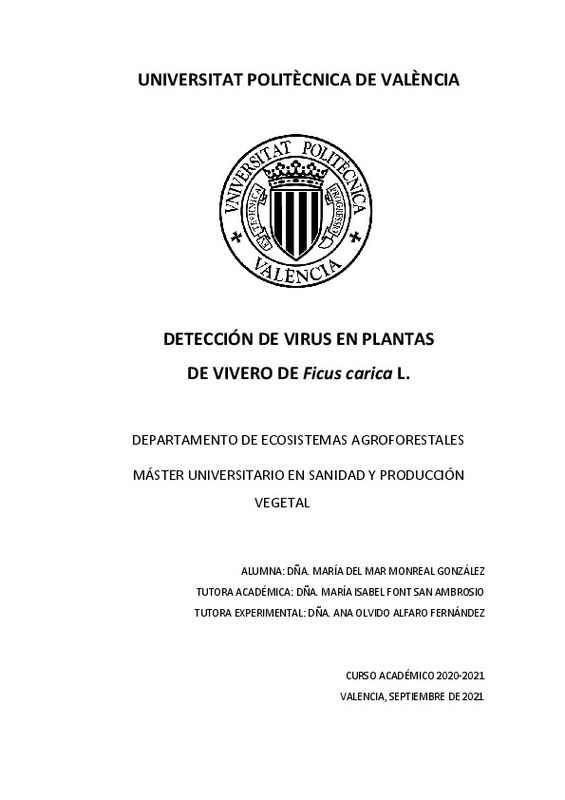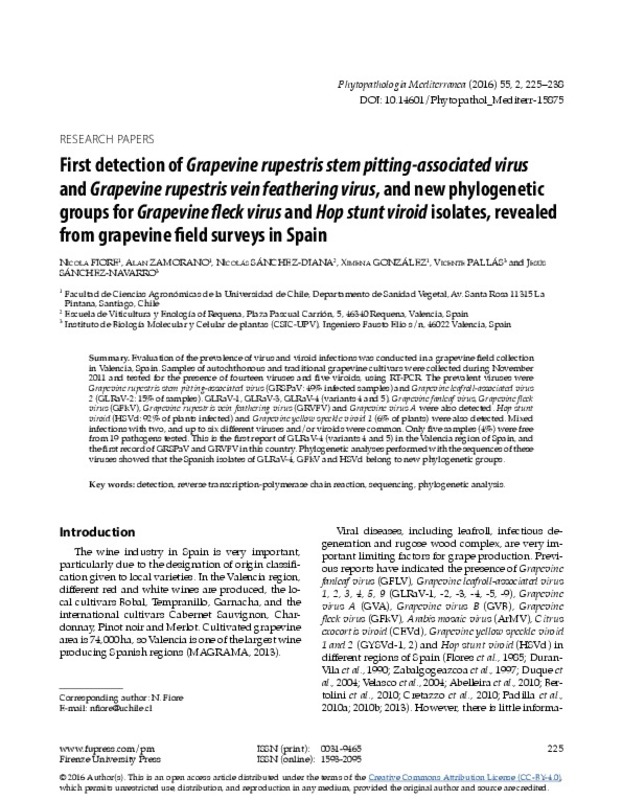JavaScript is disabled for your browser. Some features of this site may not work without it.
Buscar en RiuNet
Listar
Mi cuenta
Estadísticas
Ayuda RiuNet
Admin. UPV
Detección de virus en plantas de vivero de Ficus carica L.
Mostrar el registro sencillo del ítem
Ficheros en el ítem
| dc.contributor.advisor | Font San Ambrosio, Maria Isabel
|
es_ES |
| dc.contributor.advisor | Alfaro Fernández, Ana Olvido
|
es_ES |
| dc.contributor.author | Monreal González, María del Mar
|
es_ES |
| dc.date.accessioned | 2021-12-06T15:30:27Z | |
| dc.date.available | 2021-12-06T15:30:27Z | |
| dc.date.created | 2021-09-30 | |
| dc.date.issued | 2021-12-06 | es_ES |
| dc.identifier.uri | http://hdl.handle.net/10251/177934 | |
| dc.description.abstract | [ES] El vivero de plantas Orvifrusa S.L., situado en el municipio de Chiva (Valencia), tiene una amplia gama de árboles frutales, entre los que destacan sus variedades de higuera (Ficus carica L.). Este vivero obtiene los plantones de dicha especie mediante propagación vegetativa a partir de plantas madre. Durante 2020 y 2021 se observaron, tanto en las higueras empleadas para la propagación como en los plantones obtenidos, síntomas que podrían estar relacionados con la enfermedad del mosaico de la higuera (Fig Mosaic Disease, FMD). Aunque hay distintos virus asociados a esta enfermedad, en España sólo se han detectado hasta la fecha: fig mosaic virus (FMV), fig leaf mottle-associated virus 1 (FLMaV-1) y fig mild mottle-associated virus (FMMaV). Con la finalidad de conocer si el material vegetal de higuera de este vivero estaba infectado con estos virus, el vivero ha contratado al Laboratorio de Virología del Instituto Agroforestal Mediterráneo de la Universitat Politècnica de València para analizar estos tres virus. Los objetivos de este TFM fueron: analizar los plantones obtenidos en 2021 de distintas variedades de higuera para verificar si están infectadas con FMV, FLMaV-1 y FMMaV mediante la técnica molecular RT-PCR; establecer un catálogo de síntomas asociados a los virus detectados en higuera en este vivero y establecer el estado sanitario de los plantones obtenidos en 2020 para seleccionar árboles libres de FMV y aislarlos como fuente de material libre del virus. Para ello, se llevaron a cabo dos muestreos en las instalaciones de esta empresa. En el primero, de las dos variedades estudiadas, Blanca Gota de Miel y Cuello de Dama Blanca, se detectó un 100% (n=6) de positivos para FMV en la primera especie, mientras que para la segunda fue de un 83,33 %, estando co-infectadas con FLMaV-1 en el 66,67 % (n=6) de los casos. Sin embargo, no se obtuvo ningún positivo en FMMaV en ninguna de las dos variedades. Por el momento, no se pudo establecer una relación entre la sintomatología y el virus presente en las muestras, debido al elevado porcentaje de infecciones mixtas detectadas. En el segundo muestreo se analizaron 4 variedades para FMV, el orden de positivos fue del 80 % (n=5) en Blanca Gota de Miel, 33,3% (n=3) en la variedad Ronde de Bordeaux, de un 66,67 % (n=4) en Cuello de Dama Blanca y del 50% (n=2) en Breva. Estos resultados permitieron separar un total de 10 plantones asintomáticos y negativos a FMV: 2 de Blanca Gota de Miel, 3 de Ronde de Bordeaux, 3 de Cuello Dama Blanca y 2 de Breva. Estos serán monitorizados y analizados, y en caso de confirmarse los resultados negativos a FMV podrán ser empleados como material de propagación libre del virus. | es_ES |
| dc.description.abstract | [EN] The plant nursery Orvifrusa S.L., placed in Chiva (Valencia), cultivates a broad range of fruits trees, among them different fig tree varieties (Ficus carica L.). This nursery obtains thefig seedlings by vegetative propagation from mother plants. During 2020 and 2021, symptoms related to the Fig Mosaic Disease (FMD) were observed in the fig trees used for propagation and in the seedlings obtained. There are different viruses associated to this disease, however in Spain only three have been detected to date: fig mosaic virus (FMV), fig leaf mottle-associated virus 1 (FLMaV-1) and fig mild mottle-associated virus (FMMaV). In order to determine if the fig tree plant material of this nursery was infected by these viruses, the Virology Laboratory of the Mediterranean Agroforestry Institute of the Polytechnic University of Valencia was hired to analyse the material for these three viruses. The objectives of this TFM were: to analyse the seedlings obtained in 2021 from different fig tree varieties to verify if are infected with FMV, FLMaV-1 y FMMaV; to establish a catalogue of symptoms associated toeach of these three viruses and to establish the sanitary status of the seedlings obtained in 2020 to select trees free of FMV and to isolate them as source of free virus plant material. For that, two sampling in the installations of this company were carried out. In the first one, the results of the analyses determined that the two studied varieties, Blanca Gota de Miel and Cuello de Dama Blanca, a 100% (n=6) and 83,33% of positives to FMV were detected respectively. In the second variety, a mixed infection of FMV and FLMaV-1 was detected in 66,67 % (n=6). FMMaV was not detected in any of the two varieties.It was not possible to perform the symptom catalog for each viruses due to the high range of plants mix infected with the two viruses (FMV and FlMaV-1) In the second sampling, 4 varieties were analyzed to FMV and the results obtained showed: 80 % (n=5), 33,3% (n=3), 66,67 % (n=4) and 50% (n=2) ttested positive to FMV for Blanca Gota de Miel, Ronde de Bordeaux, Cuello de Dama Blanca and Breva, repectively.. A total of 10 symptomless plants which tested negative to FMV were isolated: 2 of Blanca Gota de Miel, 3 of Ronde de Bordeaux, 3 of Cuello Dama Blanca and 2 of Breva. These plants will be monitored and analyzed in the future to confirm these negative results and will be destined as source of propagation material free of FMV. | es_ES |
| dc.format.extent | 32 | es_ES |
| dc.language | Español | es_ES |
| dc.publisher | Universitat Politècnica de València | es_ES |
| dc.rights | Reserva de todos los derechos | es_ES |
| dc.subject | Virus de RNA de plantas | es_ES |
| dc.subject | Síntomas de las plantas | es_ES |
| dc.subject | Higueras | es_ES |
| dc.subject | Enfermedad del mosaico de la higuera | es_ES |
| dc.subject | Virus del mosaico de la higuera | es_ES |
| dc.subject | RT-PCR | es_ES |
| dc.subject | Fig tree | es_ES |
| dc.subject | Fig Mosaic Disease (FMD) | es_ES |
| dc.subject | Fig mild mottle-associated virus (FMMaV) | es_ES |
| dc.subject | Fig leaf mottle-associated virus 1 (FLMaV-1) | es_ES |
| dc.subject | FMV Symptoms | es_ES |
| dc.subject.classification | PRODUCCION VEGETAL | es_ES |
| dc.subject.other | Máster Universitario en Sanidad y Producción Vegetal-Máster Universitario en Sanitat y Producció Vegetal | es_ES |
| dc.title | Detección de virus en plantas de vivero de Ficus carica L. | es_ES |
| dc.type | Tesis de máster | es_ES |
| dc.rights.accessRights | Abierto | es_ES |
| dc.contributor.affiliation | Universitat Politècnica de València. Departamento de Ecosistemas Agroforestales - Departament d'Ecosistemes Agroforestals | es_ES |
| dc.description.bibliographicCitation | Monreal González, MDM. (2021). Detección de virus en plantas de vivero de Ficus carica L. Universitat Politècnica de València. http://hdl.handle.net/10251/177934 | es_ES |
| dc.description.accrualMethod | TFGM | es_ES |
| dc.relation.pasarela | TFGM\144175 | es_ES |









